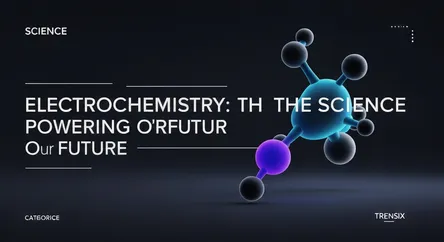Science
Electrochemistry: The Science Powering Our Future

An essential guide to electrochemistry, the science linking electricity and chemical reactions that is driving innovations in batteries and green tech.
What is it?
Electrochemistry is a branch of chemistry that studies the relationship between electricity and chemical change. It focuses on reactions that produce or are caused by an electric current, known as oxidation-reduction (redox) reactions, where electrons are transferred between chemical species. These processes occur in electrochemical cells, which can either generate electricity from a spontaneous chemical reaction (like in a battery) or use electricity to drive a non-spontaneous reaction (a process called electrolysis). At its core, electrochemistry is the science of converting chemical energy into electrical energy and vice-versa.
Why is it trending?
Electrochemistry is at the forefront of the global shift towards sustainable technology. It is the fundamental science behind the development of high-performance batteries for electric vehicles (EVs) and large-scale energy storage systems for renewable sources like solar and wind power. Researchers are actively using electrochemical methods to create green solutions, such as converting captured CO₂ into useful chemicals and fuels, developing more efficient fuel cells, and enabling new methods for environmental cleanup and water treatment. This makes it a critical field for tackling climate change.
How does it affect people?
Electrochemistry is integral to modern daily life. It powers countless portable devices, from smartphones and laptops to hearing aids and watches. In medicine, electrochemical sensors are vital for applications like glucose monitoring for diabetics. Many industrial processes, including the production of essential chemicals like chlorine, the refining of metals such as copper and aluminum, and the application of protective anti-corrosion coatings (electroplating), all rely on electrochemical principles. Even biological functions, like nerve signal transmission, have an electrochemical basis.